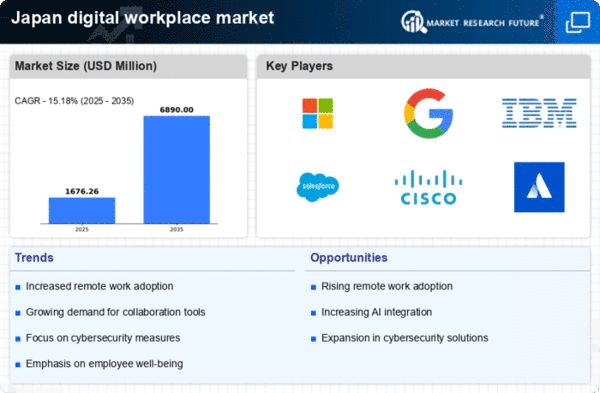Advancements in Cloud Computing Technologies
The digital workplace market in Japan is significantly influenced by advancements in cloud computing technologies. As businesses increasingly migrate to cloud-based solutions, the demand for scalable and secure digital workplace tools rises. Recent statistics reveal that over 75% of Japanese enterprises have adopted cloud services, enabling them to enhance collaboration and data accessibility. This transition not only streamlines operations but also reduces IT costs, making it an attractive option for organizations. The digital workplace market is poised for growth as companies seek innovative cloud solutions that support remote work and improve operational efficiency, thereby reshaping the future of work in Japan.
Growing Demand for Flexible Work Arrangements
The digital workplace market in Japan experiences a notable surge in demand for flexible work arrangements. Organizations are increasingly recognizing the need to adapt to diverse employee preferences, which has led to the implementation of hybrid work models. According to recent data, approximately 60% of Japanese companies have adopted some form of remote work policy. This shift not only enhances employee satisfaction but also boosts productivity levels. As a result, the digital workplace market is evolving to provide tools and solutions that facilitate seamless collaboration and communication among remote teams. The emphasis on flexibility is likely to drive innovation in the market, as companies seek to integrate advanced technologies that support a dynamic work environment.
Emphasis on Employee Well-being and Engagement
In the context of the digital workplace market, there is a growing emphasis on employee well-being and engagement in Japan. Organizations are increasingly investing in digital tools that promote mental health and work-life balance. Recent surveys indicate that 70% of employees value companies that prioritize their well-being. This trend is prompting businesses to adopt platforms that facilitate employee feedback, recognition, and wellness programs. By fostering a supportive work culture, companies can enhance employee retention and productivity. Consequently, the digital workplace market is likely to see a rise in solutions that cater to these needs, creating a more engaged workforce and driving overall business success.
Regulatory Compliance and Data Privacy Concerns
In Japan, the digital workplace market is shaped by stringent regulatory compliance and data privacy concerns. Organizations are increasingly required to adhere to laws such as the Act on the Protection of Personal Information (APPI), which mandates strict data handling practices. As a result, companies are investing in digital workplace solutions that ensure compliance while safeguarding sensitive information. Approximately 65% of businesses report that data privacy is a top priority in their digital transformation strategies. This focus on compliance is likely to drive demand for secure digital tools that facilitate safe collaboration and communication, ultimately influencing the growth trajectory of the digital workplace market.
Integration of Advanced Communication Technologies
The integration of advanced communication technologies is a pivotal driver in the digital workplace market in Japan. As organizations strive to enhance collaboration among remote teams, the adoption of tools such as video conferencing, instant messaging, and project management software is on the rise. Recent data indicates that nearly 80% of Japanese companies utilize some form of digital communication platform. This trend not only facilitates real-time collaboration but also fosters a sense of community among dispersed teams. The digital workplace market is likely to expand as businesses seek innovative communication solutions that enhance productivity and streamline workflows, thereby transforming the way work is conducted in Japan.
















